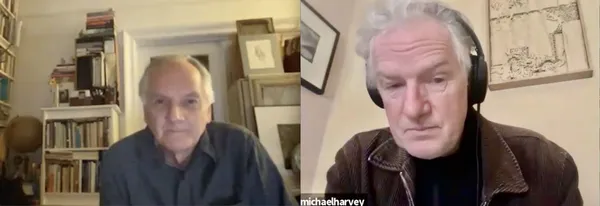In the second installment of Mick Harvey’s conversation with music producer and 99 Records founder, Ed Bahlman, on Mutiny In Heaven: The Birthday Party, they discussed The Birthday Party leaving Melbourne in 1980 to live in London; the differing life experiences at that time for him, Phill Calvert, and Tracy Pew, compared to Nick Cave and Rowland S Howard; British bands - The Fall, Joy Division, Echo and the Bunnymen, Killing Joke, The Pop Group and Mark Stewart; Lindsay Gravina’s on-camera interviews; Richard Lowenstein and Lynn-Maree Milburn’s Autoluminescent: Rowland S Howard; reconnecting with Thomas Wydler, Beate Bartel, and Mania D in New York; Nick Cave’s evangelical quest, and Mick’s response to the comment by producer Tony Cohen that he was the brains in the recording studio.
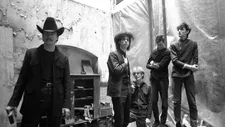 |
| The Birthday Party - Tracy Pew, Nick Cave, Phill Calvert, Mick Harvey and Rowland S Howard |
Mick Harvey is currently working on his latest album titled Five Ways to Say Goodbye and plans to do a Phantasmagoria in Blue tour with Amanda Acevedo in Australia and New Zealand during the New Year of 2024.
From Melbourne, Mick Harvey joined us on Zoom for a conversation on Mutiny in Heaven: The Birthday Party and his prolific creativity since the demise of the band 40 years ago.
Ed Bahlman: The way the conditions are described [in Mutiny in Heaven] when you arrived in London, they were so harsh.
Mick Harvey: Look, again, this is something I had to deny repeatedly. I think Nick and Rowland had a pretty awful time in England. They didn’t have any money and were pretty much unemployable.
EB: Were you working there?
MH: Like a lot of people I know were completely unemployable, like most of my friends. They both were using drugs so they had to get money from somewhere, so they had a miserable time, but the rest of us were not in that same situation. But they were the ones doing most of the interviews, so you get a kind of skewed version of the way things were.
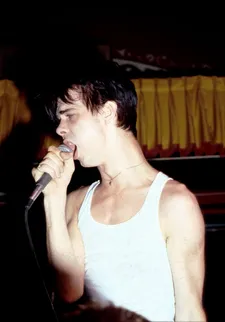 |
| Mick Harvey on Nick Cave: “He certainly likes discussing things that are relevant to his current work …” |
EB: Got it.
MH: I’m a little tired of this entire depiction of everyone being angry and raging against London, it’s kind of completely overplayed. Anyway, that’s certain people’s version of events.
EB: Well, we can get your version out.
MH: The documentary is accommodating all the different views so it belongs in there. But it certainly wasn’t mine or Phill’s experience, or Tracy’s really. But that’s become part of the …
Anne-Katrin Titze: … the myth?
MH: Yeah, part of the legend of what was going on.
EB: Which British bands were you the closest to when you first arrived in London, that you appreciated?
MH: I think Nick mentions the two bands that we really had time for. The Pop Group were held very dear by the band as a kind of guide for how things could be, if you want to be that extreme. And The Fall were very much loved. There were a lot of other bands that we liked. I think how it’s told in the film, particularly by Rowland, about how terrible these bands were and how disappointing they were - I think part of the point is that there was an expectation that they’d be better. They were bands we weren’t disinterested in and seeing them live was a great disappointment, especially because we knew how good we were live. We’d been playing hundreds of shows in Australia and we kind of knew how to play and deliver what we were doing in the live setting.
And these bands in London were fresh from the cover of the NME and they’d played three shows in their life or something and they didn’t know what they were doing. It was surprising that they were so insipid. There were exceptions of course. In particular Joy Division and Killing Joke, both of whom I wasn’t necessarily a big fan of, but they were really good live, you know, very powerful bands. Something like Echo and the Bunnymen, for instance, they weren’t up to speed yet, but I saw them again about six years later and they were really good. It’s all about experience. The context in the film about a lot of things and what’s actually been said by people is sometimes not really there.
 |
| And The Ass Saw The Angel signed by Nick Cave and given to Ed Bahlman Photo: Anne Katrin Titze |
Because it’s all from archival interviews. Ian [White] pieced the story together. He only had what they had said historically. He couldn’t kind of direct the questions or kind of massage the answers, he only had certain material to work with. Obviously with Rowland there was no way to get any new interviews anyway. So there are limitations with the precise nature of how the story is being told as well. Which is the case with any way you tell a story. You understand what I’m saying?
AKT: Especially with archival footage.
EB: Did you hear that Mark Stewart died this year?
MH: Yes I know.
EB: He was living in Brooklyn.
MH: Was he in Brooklyn? He’d been in Berlin for some time. I didn’t actually hear where he was when he died.
EB: The person who told us was Dennis Bovell. He was still in touch when he came to New York for Babylon.
MH: How long had he been in Brooklyn?
EB: For quite some time.
MH: Had he? Okay. I’d seen him in Berlin a couple of times, but when I think about it, it’s probably ten years ago.
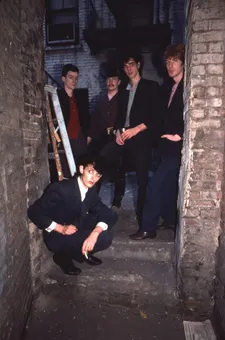 |
| Mick Harvey, Tracy Pew, Nick Cave, Phill Calvert and Rowland S Howard upfront |
EB: Are you still in touch with Thomas Wydler?
MH: Yes, I saw him in Berlin in September and we had lunch with him. He’s better. He’s been quite unwell for a time and even stopped going on tour with the Bad Seeds because he couldn’t really play and tour anymore because he wasn’t well enough. But he’s found a magic cure for his problem and he’s been better for a year now. It’s been kind of a miracle.
AKT: Because Ed lost a postcard that Thomas had sent him with his email. Can you in any way connect the two?
MH: Sure. I can give you Thomas’s address. Immer noch die selbe alte E-mail Adresse.
AKT: Immer noch die selbe alte E-mail Adresse!
MH: Seit einer Ewigkeit hat er das gehabt. And I’ll get Beate’s.
EB: It’s good to know they’re still together.
MH: They are, yeah, yeah. It’s been a tough time for Thomas.
EB: When Mania D came to New York, I DJ’d the event.
MH: When did they go, early Eighties?
EB: Yes, they played TR3 down in SoHo. Who’s Lindsay Gravina, who had the on-camera interviews?
MH: Lindsay, he did the on-camera interviews, basically they’re with me and Rowland, I think. Phill and Nick’s are with someone else because his interview with Nick was a bit of a failure. He’s a record producer. He’s the guy Rowland roped in, to try and originally make the documentary about him. But he’s not a filmmaker, so he did a whole lot of interviews with people but I think Rowland at some point, when he was on his last legs, realised that in fact Lindsay was never going to be able to make the film because he wasn’t a filmmaker and didn’t have any idea how to end up making a film.
 |
| Nick Cave and the Bad Seeds set list signed by Thomas Wydler, Mick Harvey and Nick Cave with Henry’s Dream tour All Access Pass Photo: Anne Katrin Titze |
So he enlisted Richard Lowenstein [and Lynn-Maree Milburn], who made a documentary [Autoluminescent: Rowland S Howard, 2011] on Rowland eventually. Eventually he had so many arguments with Lindsay that he didn’t use any of Lindsay’s material. Lindsay still had all of that material, so he still wanted to make his documentary. But everyone said, why make a second documentary on Rowland, we should be making one about The Birthday Party! That’s something that would have much better traction and that’s how we ended up starting on this project. Again, because of Lindsay wanting to do something with his material.
But he’s still unsatisfied with what’s been done with his material. He’s one of a few people who Rowland kind of enlisted as acolytes who he would obsess to about the breakup of the band and how badly done by Rowland was in the breakup of the band. This obsessional kind of nonsense, in my opinion nonsense, that Rowland would go on with.
And Lindsay feels committed to oblige, he feels a responsibility to Rowland to tell this story of Rowland’s, so he still wants to use all the material that is around that subject, which Ian White, the director of the documentary in his infinite wisdom chose to leave out because it was a load of nonsense and it was all negative and just didn’t belong in the documentary he was making. Which is why we have the almost comedic finale of Nick again pretending he doesn’t remember what happened and saying, I don’t know, the band just finished, or something. Again, like the story about changing the band’s name, it’s a little too prosaic for him to discuss.
AKT: Print the legend!
MH: I’m sorry?
AKT: Print the legend, as in John Ford's The Man Who Shot Liberty Valance.
MH: Yeah, print the legend! Or invent a vague kind of fanciful story and embellish that. That’s another option.
 |
| Thomas Wydler + Beate Bartel postcard from Berlin to Ed Bahlman Photo: Anne Katrin Titze |
EB: Nick is always good at plausible deniability.
MH: Yeah, he certainly likes discussing things that are relevant to his current work and position and he likes to interpret past events based on his current position, which is one valid way to do it. There’s a certain validity in some of the conclusions you can draw from that approach.
It makes it difficult for him to talk about specifics of The Birthday Party as a band and what our aims were, because currently, you know, he’s kind of on some evangelical spiritual mission. So it’s pretty hard for him to align the two things, I think. But those were interviews done a while ago, during the second Grinderman album, I think. When are they from?
EB: 2007 in the end credits.
MH: 2007, so he’s very interested in talking about how he found his direction with his writing and his voice as a songwriter. So he likes talking about that sort of thing but he’s not really interested in addressing how we came up with the name or what happened when the band broke up. It’s really too boring for him.
EB: Is it Tony Cohen who calls you the brains in the studio?
MH: Yeah, I don’t know about that.
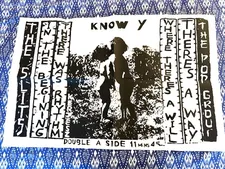 |
| The Slits - The Pop Group, 1980, collection Ed Bahlman Photo: Anne Katrin Titze |
EB: C’mon!
MH: Nah, nah, I think Tony’s being fast and loose with the information there. In The Birthday Party, I’m not sure that’s quite accurate. I would say subsequently with the Bad Seeds through the Eighties and the work I did with Tony in that time that perhaps I was in a role where I could have been perceived that way. But with The Birthday Party it was definitely, as is depicted in the documentary, a band effort.
Read what Mick Harvey had to say on being in Wim Wenders’ Wings Of Desire as a member of Crime & The City Solution and the Bad Seeds; Wenders’ latest films, Anselm (Anselm - Das Rauschen Der Zeit on Anselm Kiefer) and Perfect Days (Japan’s Oscar submission); PJ Harvey, and Mick’s take on translating and recording four albums of Serge Gainsbourg songs (Intoxicated Man, Pink Elephants, Delirium Tremens, Intoxicated Women) in English, and Jane Birkin performing at the French Institute Alliance Française in New York.








